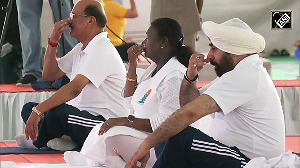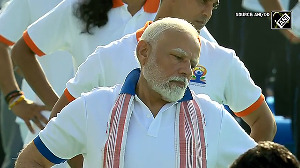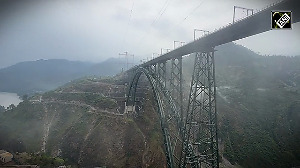Prime Minister Manmohan Singh's pet task force, headed by strategic guru K Subrahmanyam, is likely to recommend strong ties with the United States and suggest a roadmap to take the relationship forward.
The task force is expected to submit the report to Dr Singh in July.
Since Independence, this is the first such official exercise where future global trends have been discussed and the best-suited policy options for the country have been suggested.
Commodore Uday Bhaskar (deputy director-general, Institute of Defence Studies & Analysis) is the member-secretary of the task force. Other members are Professor P Rama Rao (former chairman, Atomic Energy Regulatory Board), Dr R K Pachauri (director, The Energy & Resources Institute), Dr Arvind Virmani (director, Indian Council for Research on International Economic Relations), Tarun Das (former director-general, Confederation of Indian Industry), Air Marshal (Retd) Vinod Patney, Professor M S Ananth (director, Indian Institute of Technology-Madras) and Professor Amitabh Mattoo (expert on security matters and the vice-chancellor of Jammu University).
- Don't Miss: A task force to sell US to India
The task force was constituted late last year to examine various aspects of 'global trends in strategic affairs' and its implications to the Indo-US relationship.
The 200-odd-page report with five major sections -- including one each on strategic issues, the nuclear issue and the economy -- will be concise and direct.
The task force has also stressed on the need for import of the latest nuclear technology and also India's potential for energy security with help of thorium reserves.
In India most task forces and reports of special committees gather dust but if this report is accepted and implemented by the government it will be a trend-setting event, claims a Delhi-based Strategic expert.
If the government accepts the recommendations -- and accordingly changes it's foreign policy -- Subrahmanyam will become the George Kennan of India, a security expert said.
- Complete Coverage: The Indo-US nuclear tango
Kennan, a US diplomat, who in the 1940s served in Russia is famous for his long telegram to his bosses guiding them on how to handle diplomatic relations with Russia during the Cold War.
Now, Subrahmanyam is showing the way to the Indian government on how to handle the US. Thanks to his zeal and hard work, the task force has completed its task in less than seven months.
Subrahmanyam had also headed the Kargil Review Committee that looked into the way the war was fought and looked into intelligence, operational and other deficiencies.
In the seven months, week after week, the members of the task force met for brainstorming sessions and many experts from various fields were invited to present their views.
Says a top government source: 'Never before has such an exercise been conducted when during the debate so much heat was generated. The committee arrived at conclusion only after extensive debates.'
Although Subrahmanyam refused to speak on the issue before the report is submitted to the prime minister, he had on an earlier occasion told rediff.com: "With India and the US entering into a strategic partnership, it's time to think realistically. Why are we doing it? Remember, it's not just a relationship, but a partnership. Our work is to give inputs to the government on a range of issues, including the understanding of India's long term interests.
"We are thinking about all aspects relating to co-operating with the US on democracy initiatives, on the energy issue, on how to deal with terrorists and weapons of mass destruction."
Subrahmanyam has never justified the American invasion in Iraq nor does he agree with US policy on terrorism, but he argues that analytical Indian brains should not be prejudiced against the US and the focus should be on what lies in India's long-term national interest.
One shouldn't be lead to believe that the report will eulogise the merits of the Indo-US relationship, insists a member.
"India and the US -- both are very difficult counties to handle. Both have peculiar strategic cultures. Their security perceptions differ. This is a challenge before policy makers of both countries.
"Also, after 10 to 15 years, how are we going to stand up against pressures of both countries? India should think now."
Another member said: "India has problems with the US policy on Iraq and the US does not entirely accept our take on Pakistan. It's a challenge to maximise the advantages in favour of India. India's short term gains and long term prospects are well-defined in the report of the task force."
While most eyes are on what the report says about Indo-US ties, quite a few analysts feel that the most interesting aspect of the report, though, will be the task force's views on how India will fare vis-à-vis China's economic might after 10 to15 years.






